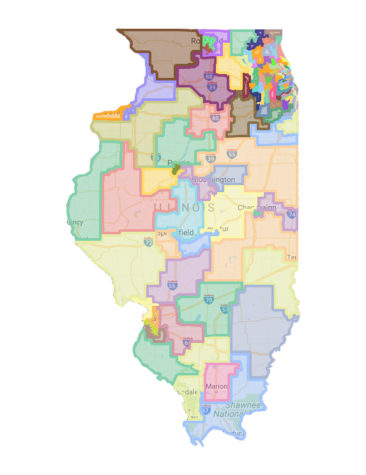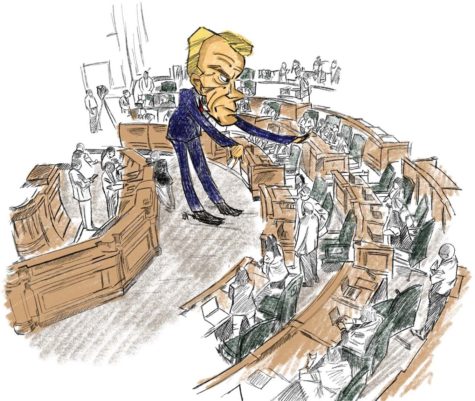Two Hundred Years of Corruption in the Prairie State
Illinois is no stranger to corruption. As is so often mentioned, four of our last seven governors have been sent to prison.
The most famous of these is likely former Gov. Rod Blagojevich, who was impeached in 2009 following allegations that he had tried to sell Barack Obama’s senate seat and later convicted to 14 years in prison. Many criticized his sentence by claiming that nearly every politician is corrupt, and that specifically going after Blagojevich was short-sighted. This is not necessarily wrong; in many ways, Illinois’ entire history is steeped in corruption
Dan Walker, governor from 1973 to 1977, spent a year and a half in federal prison after making $1.4 million on fraudulent loans that he used to pay personal expenses.
Otto Kerner, governor from 1961 to 1968, had spent three years in prison for bribery, conspiracy, lying under oath, income tax evasion, and mail fraud when it was revealed he made deals with a horse racing association and neglected to mention it on tax returns.
George Ryan, governor from 1991 to 1999, was sent to prison for six years following the reveal of a massive racketeering conspiracy that led to 78 other people being charged.
Even more governors have barely escaped being given prison time for crimes. William Stratton, governor up until 1961, was acquitted after being charged with misuse of campaign funds.
Lennington Small, Illinois governor in the 1920s, was acquitted during his term after being charged with embezzling upwards of $1 million in state funds— $14.6 million adjusting for inflation.
The trend goes as far back as Joel Aldrich Matteson, governor from 1853 to 1857, who attempted to cash $200,000 ($5 million today) worth of stolen government scrip he “found” in a shoebox. He escaped formal accusation by promising to pay it back and saying he did not know how the scrips had gotten there.
Of course, it’s not just the governors. Chicago’s mayor from 1915 to 1923 and from 1927 to 1931, William Thompson, also known as ‘Big Bill,’ was supported by the famous gangster Al Capone and rumored to be on Capone’s payroll.
“He made Chicago a byword for the collapse of American civilization,” said the Chicago Tribune in 1931.
The Chicago mayor from 1989 to 2011 was investigated for corruption and has a long list of scandals.
The story goes on. According to a study from the University of Illinois at Chicago (UIC), Illinois is the third most corrupt state in the country, behind only New York and California, and lists Chicago as the most corrupt city in the country.
While many Illinois politicians been charged with or even sentenced of a crime revolving around corruption, others have not, or simply cannot be caught. Legal corruption is an existing problem; while a politician may not commit any technical illegal acts, that does not necessarily mean they are free from corruption.
A Harvard study defines legal corruption as “political gains in the form of campaign contributions or endorsements by a government official, in exchange for providing specific benefits to private individuals or groups, be it by explicit or implicit understanding.” While this may be legal in the literal interpretation of the law, it would be considered unsavory by the great majority of people.
This was part of the problem in Blagojevich’s trial. While he proclaimed his innocence, legal professionals wondered what the trial would mean for politics in Illinois. His “raw deal,” as it is called in a Politico article, “would make criminals out of virtually every politician.”
“If you gave me an FBI agent and subpoena power and gave me a random city council person or state legislator from any state in the country … I could find something,” said Sam Heldman, a lawyer who had previously represented former Alabama governor Don Siegelman.
The more Blagojevich proclaimed his innocence, the easier this was to see. Part of why he was convicted was because he had tried to collect campaign donations from people who wanted him to implement a certain vision in his government. His claim of innocence was never that he did not do anything; he simply claimed that the things he did were not illegal.
Perhaps Illinois’ corrupt past is too much to overcome. Corruption may be so deeply embedded in our state’s culture that it is impossible to get rid of, and the continuous arrests of individuals like Blagojevich do not so much as put a dent in the problems we face.
One could say it’s pitiful that many Illinois citizens have accepted our corruption as something of a cultural thing to joke about rather to feel concerned over. But at the same time, with so much corruption, it may just as well be coping. When corruption is so deep and long-running in the political system, how can one rely on their representatives to fix the problem?



